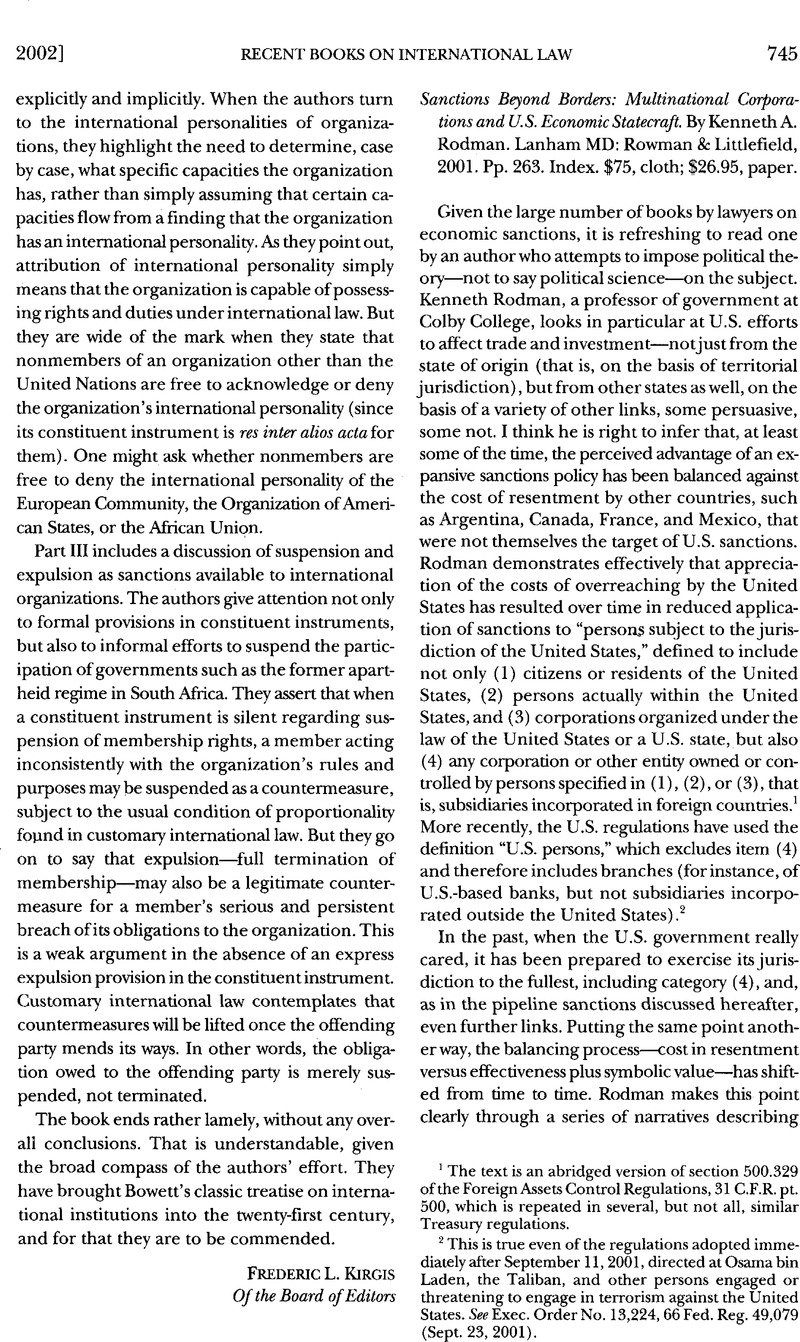No CrossRef data available.
Published online by Cambridge University Press: 27 February 2017

1 The text is an abridged version of section 500.329 of the Foreign Assets Control Regulations, 31 C.F.R. pt. 500, which is repeated in several, but not all, similar Treasury regulations.
2 This is true even of the regulations adopted immediately after September 11, 2001, directed at Osama bin Laden, the Taliban, and other persons engaged or threatening to engage in terrorism against the United States. See Exec. Order No. 13,224, 66 Fed. Reg. 49,079 (Sept. 23, 2001).
3 See Restatement (Third) of the Foreign Relations Law of the United States §§414, 431 (1987).
4 In addition to the Restatement, see Andreas, F. Lowenfeld, National Jurisdiction and the Multinational Enterprise, in International Litigation and The Quest for Reasonableness (revision of 245 Recueil Des Cours 9–234(1994 I))Google Scholar.
5 Rodman asks at the outset whether the decline in the reach of U.S. sanctions is a consequence of what he calls the “hegemonic decline of the United States,” but in the end rejects that explanation.
6 President’s News Conference of Dec. 17, 1981, Opening Statement, 17 Weekly Comp. Pres. Docs. 1379 (1981).
7 Id. at 1381.
8 Contra “The past, at least, is secure.” Webster, Daniel, Address to the U.S. Senate (1830)Google Scholar; “Those who cannot remember the past are condemned to repeat it.” Santayana, George, Life of Reason (1922)Google Scholar.
9 Reading Article XI of the GATT literally, one might conclude that export controls are subject to international discipline. In fact, the GATT has not been so interpreted—the focus being almost entirely on measures by states to limit imports.
10 In this case (1964-65), the U.S. government, in implementing the Foreign Assets Control Regulations under the Trading with the Enemy Act, sought but ultimately failed to prevent the French subsidiary of a U.S.- based company from fulfilling a contract to supply trailers to a French company for trucks to be sold to the People’s Republic of China. Rodman discusses this episode briefly (pp. 55-56); for more detailed accounts, see, e.g., Craig, W. L. , Application of the Trading with the Enemy Act to Foreign Corporations Owned by Americans: Reflections on Fruehauf v. Massardy, 83 Harv. L. Rev. 579 (1970)CrossRefGoogle Scholar; Lowenfeld, Andreas, Trade Controls for Political Ends 91–102 (2d ed. 1983)Google Scholar.
11 See Commerce Department, Export Control Regulations, 15 C.F.R. §379.8(4) (1982). The confusion in terminology made it difficult to understand, and makes it difficult to explain, what the regulations actually prohibited. The point is that two kinds of licenses were involved: (a) export licenses issued (or denied) by the Department of Commerce; and (b) patent and know-how licenses issued by private companies, such as General Electric, which had designed the rotors and other components for the compressors to be used in the pipeline but had authorized foreign companies to produce them abroad against payment of royalties. What the stage 2 regulations did was to use the commercial licenses described in (b) as the link to impose a requirement for an official license under (a), and then to deny that license.
12 See Calvo, Carlos, Le Droit International Théorique et Pratique (5th ed. Paris 1896)Google Scholar; Donald, R. Shea, The Calvo Clause: A Problem of Inter-American International Law and Diplomacy(1955)Google Scholar.